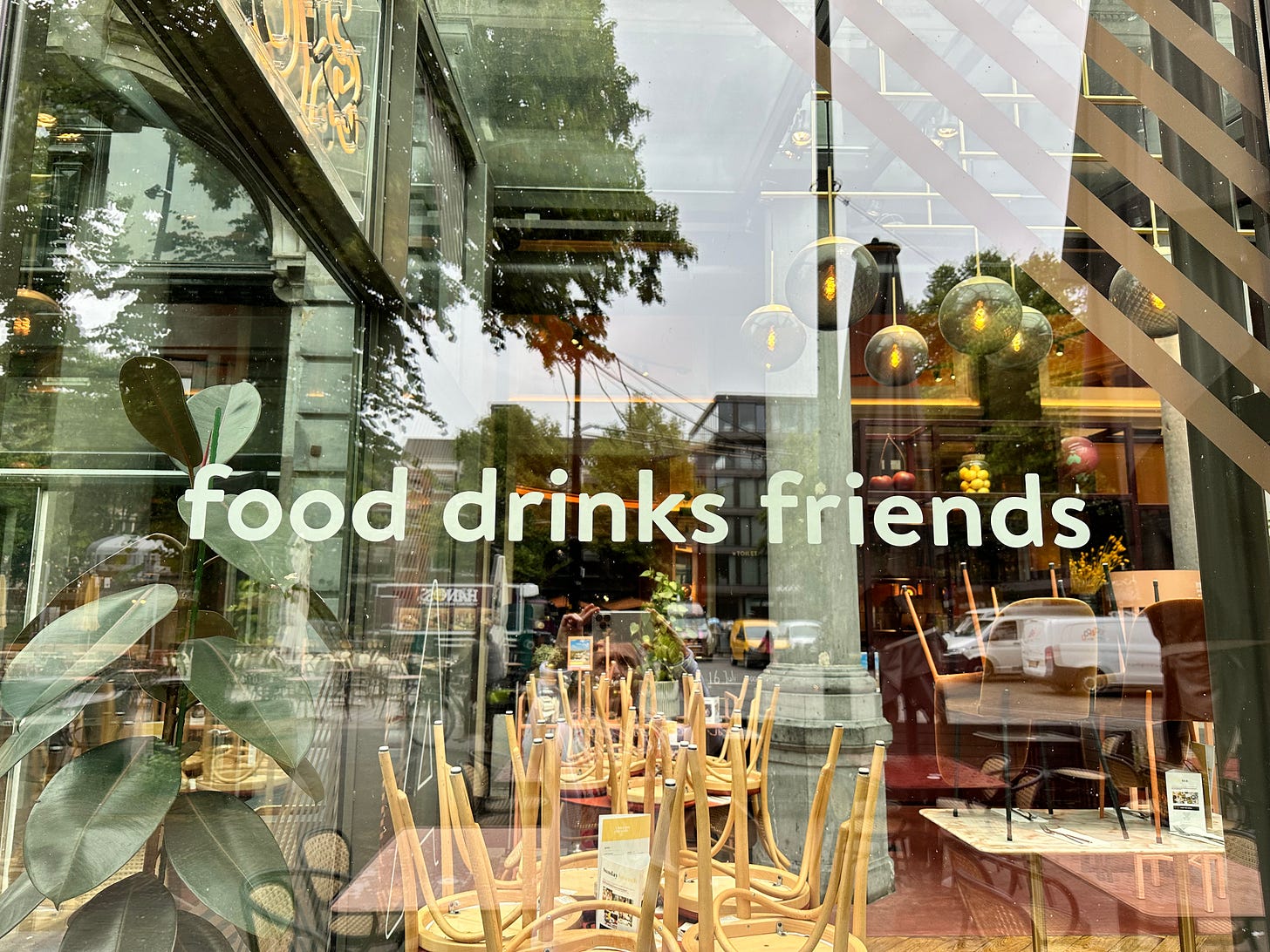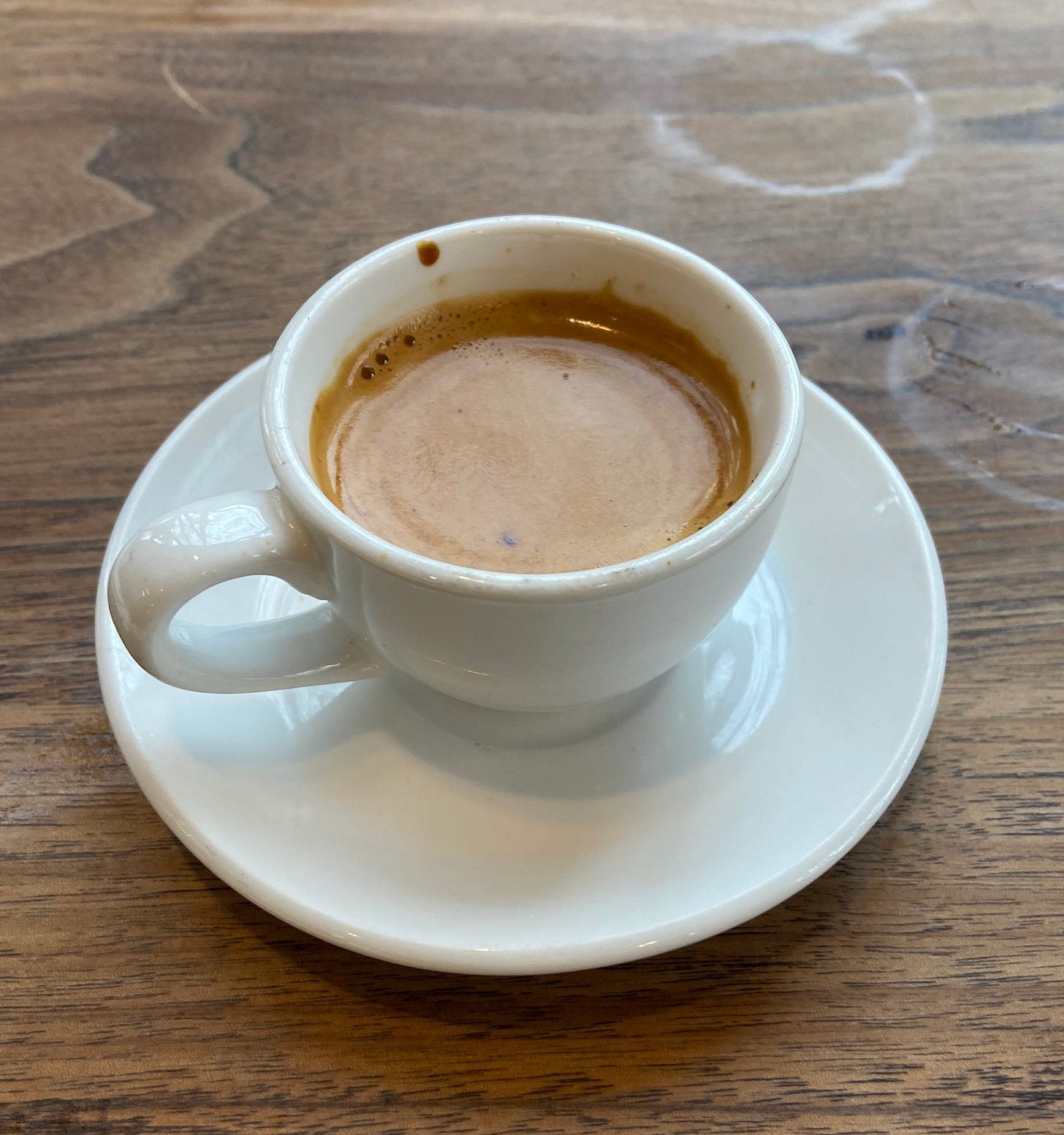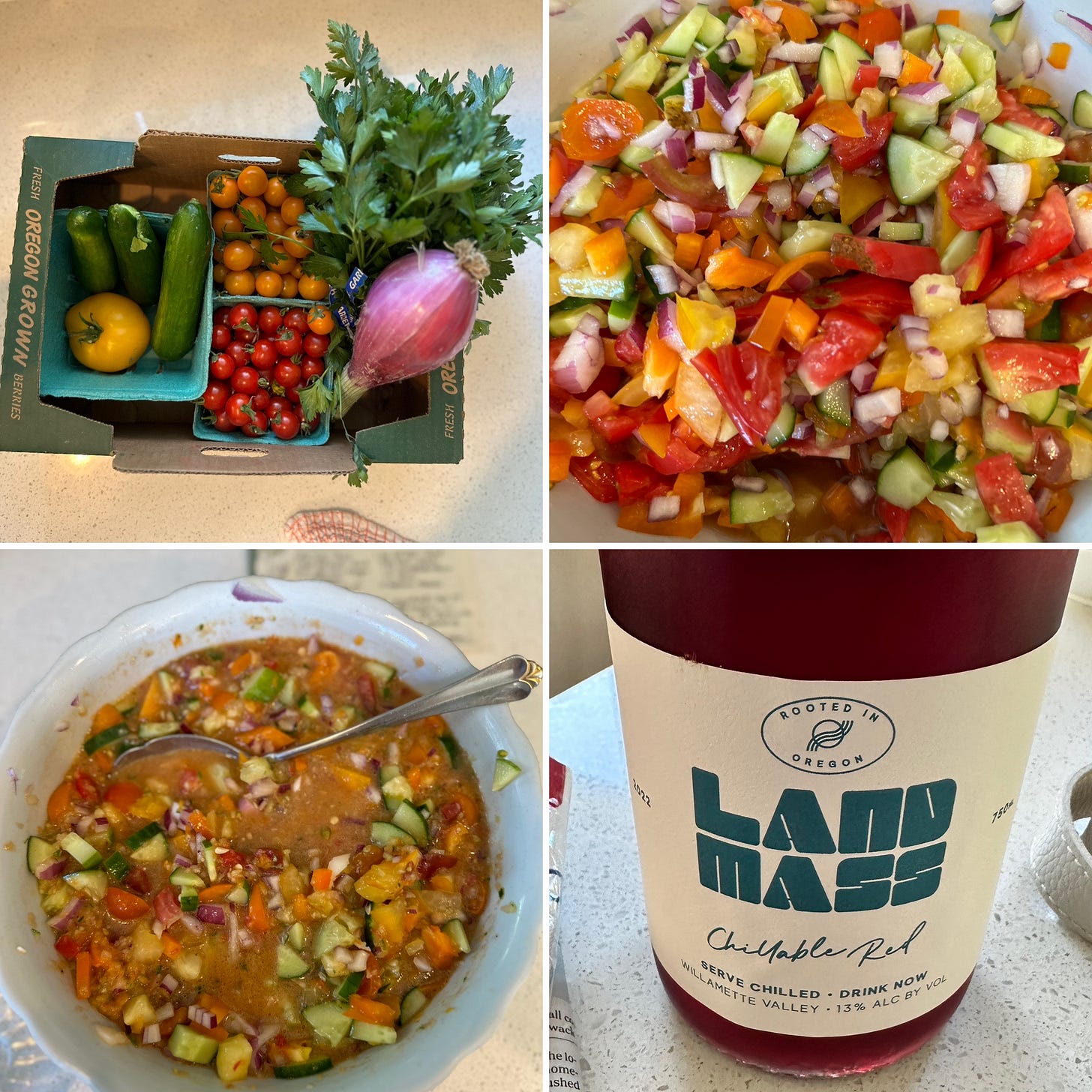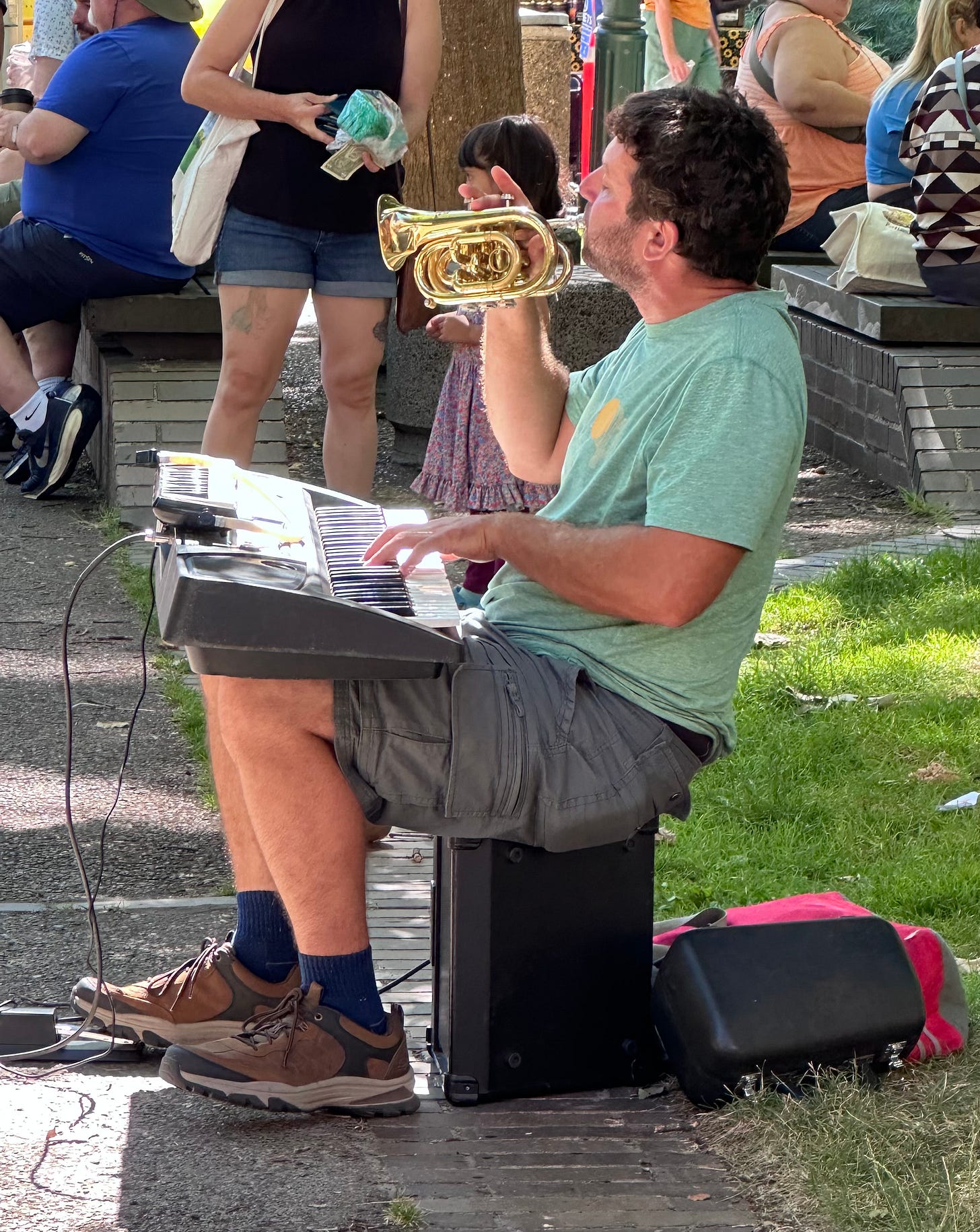Dear Ones,
In France this summer I learned a delightful life hack.
(Quick side bar, do you hate the term life hack? Aren’t we supposed to live life and not hack it? Another term for a quick trick that makes things easier is in order, ideas?)
Okay, back to my discovery: in our rental apartment the owners clothed the queen-sized bed in two light duvets. Yes! The mattress had a common bottom sheet, but across the top we each had a kick-off (me), or snuggle-up (my husband) duvet of our own. No fighting over blankets! It was the best of both worlds, sleeping together with personal climates. Liberty, equality, fraternity in the marriage bed! I plan on adopting this strategy in the winter when we routinely haggle over blankets and how wide the window should be cracked open.
More to adopt: hot cheese on crisp salad greens, chilled red wine with a fruit garnish (almost sangria but not), warmed olives with sweet/hot peppers, friends arriving early and staying late to catch a glimpse of the space station as it wanders across the night sky. I promise you, lingering around the table, you will experience a feeling not unlike happiness!
Be a friend, please press the button ⬆️⬆️⬆️ and share the newsletter. I’m growing the email list to 1k and I’m a whisper away. Thanks for introducing someone new!
read:
TRICK MIRROR, by Jia Tolentino is keeping me on my toes. Is there anything she cannot write about and make fascinating? The essay collection ranges from topics such as reality tv shows (umm, hello, she was a cast member of Girls v. Boys, Puerto Rico), the internet, difficult women, and women characters in fiction. As you can imagine, that last topic interested me deeply, it begins:
If you were a girl and you were imagining your life through literature you would go from innocence in childhood, to sadness in adolescence, to bitterness in adulthood, at which point, if you hadn’t killed yourself already, you would simply disappear.
Tolentino posits that childhood heroines show us who we want to be, they get to be humans. Teenage heroines show us who we are afraid of becoming, someone whose story is interesting only by proximity to a boy/man. These burgeoning female characters are overwhelmed by awakening sexual power which puts them in peril and which they don’t understand. Adult heroines who labor under the limited menu the world offers women, motherhood, domesticity, stultifying responsibility, and the loss of self. Of course there are exceptions, and Tolentino lists some in the essay. A few: Jenny Offill’s DEPARTMENT OF SPECULATION, Elena Ferrante’s, NEOPOLITAN NOVELS, in which women set the terms of consciousness and identity.
I began to wonder about the books that formed me. There was MANDY, by Julie Andrews Edwards, (yes, that Julie Andrews) in which an orphaned girl yearns for a home of her own, discovers an abandoned cottage in the woods and fixes it up, taking things from the orphanage, clearing the garden, etc… This was my exact dream as a child, a place of my own. Then I loved HARRIET THE SPY, by Louise Fitzhugh. Harriet was prickly, bossy, funny, and smart. She lived in NYC. She was going to be a writer! Finally, Laura Ingalls Wilder, whom I loved for her spirit and her maple snow candy. Those were girls I wanted to emulate. Somehow the next book I remember was not ARE YOU THERE GOD, IT’S ME MARGARET, by Judy Blume, which I wish someone had put in my hands, but OUR BODIES OURSELVES, which my mother left on the coffee table for eleven-year-old me, and which I carefully studied for anatomy lessons, alongside THE HAPPY HOOKER, by Xaveria Hollander. (Which probably was not intentional.) Not only did her name flummox me, but there was… just so much to ponder 😳! I jumped from child to hyper-sexualized woman in my reading until I moved on to Kurt Vonnegut, which I also didn’t fully understand, but at least I was laughing.
What books formed you? What book would you push into the hands of a child, a teenager, a young woman now? Seriously! Do drop a line in the comments. I’d love to gather a list to share with everyone.
I've made a read.write.eat. Bookshop Store, where you will find many of the books I've recommended in the newsletter. Buying books from my shop is another way you can be a friend to the newsletter.
write:
I’m headed to a writing conference in Napa next week. I am going as a student, which thrills me, and I’m also sitting on a book panel . It’s wonderful to be on the other side of the table, to remember how it feels to expose yourself through work-in-progress, to be both vulnerable and respectful. Part of being in workshop is to see your writing from new angles, to recognize your blind spots, and also to understand that you aren’t writing one-size-fits-all prose. Your writing choices and decisions both expand and contract in workshop. What do I mean by that? Your writing becomes more you as you decide what criticism is meaningful and what you can leave behind.
Plus, I’ve got a stack of ten stories to read and think about from my cohort. I’m excited to sharpen my skills as a reader and a writer, to make new friends, and to find mentors.
I encourage you to find opportunities to share your work in progress. Grub Street, Literary Arts, Gotham Writers, Catapult, Hugo House, Lighthouse Books, all offer in person and online workshops and financial help. Or, perhaps you’d like to start a writing group? If so, please let me know! I’d be happy to share my workshop guidelines with you, or you could check out, CRAFT IN THE REAL WORLD, by Matthew Salesses. Also, in my read.write.eat. bookshop I have a writing section with lots of craft books to peruse. Maybe this fall is the time to find online classes, attend a virtual reading, do whatever you can to make the work less lonely, and to diminish your own echo chamber.
Here’s a prompt for you:
This prompt, sent to me by a pal (who writes a terrific newsletter, FIELD BLEND), is a great way to immerse yourself in a moment and understand that there’s plenty to be discovered in the minutiae of a day. From Claire Dederer, her workshop leader at Aspen Words and expanded upon my me:
Think of an ordinary moment. Something so small that it can be described in passing: I walked across a field. Or: I made a sandwich. Or: I hugged my kid. Take a moment to write it as the simplest sentence possible. Then force yourself to expand it to at least three paragraphs, using all the tools of creative writing: the five senses, concrete details, weather, setting, season. If there's another character, describe that person and add dialogue. Finally, consider interiority. What is the character reminded of, or perseverating about? What lingering feeling arises and creates a lens through which the narrator describes the event, the world?
Big thanks to everyone who has bought me a coffee. I’m grateful you enjoy my newsletter, and that you took time to drop me a note and offer support. Yay! Cute button below for anyone who'd like to join in.
eat:
I pulled this out of the archives and made it last night. So delightful and easy!
The final picture is delicious chillable red wine and it paired beautifully with the meal!
I listened to this wonderful musician at the farmers market. He played this song, which I hadn’t heard in so long, and which I love. Enjoy!
If you aren't on my mailing list, you can subscribe below. And, if you'd like to buy my books, you can do so here and here. If you'd like to support the newsletter, please share with your funny and fun friends with the buttons below.
Please, remember to tell your people you love them, and take good care of your skin.
xN












I'm reading HOW TO CARRY WHAT CANNOT BE FIXED; A Journal for Grief, by Megan Devine. Out of all the books on loss, she gets it. Wish I'd had it a year ago. Picture a woman with flowers for a head with a suitcase falling open, papers flying and the quote, "Into the darkness they go, the wise and the lovely." -Edna St. Vincent Millay She says folks think grief is a problem to be solved, but really, it's an experience to be carried. You need tools to build a life along side your loss, not make that loss disappear. The journal, is what she promised...drawn on and carried around with me, served like an anchor in a storm.
I am focused on fall as a great time to find a class, a writing group, a coach - something to get me out of my head. Something to light a fire. Fall is the best season for creative beginnings, I think. The Tom Waits link is maybe the best thing to happen to me today, thanks for that. I've always got time for Tom. ❤️